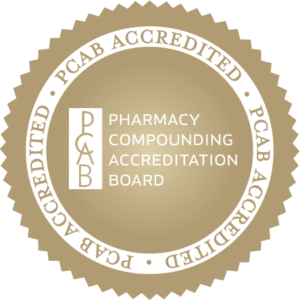Understanding Hormone Imbalance and How Compounding Pharmacies Can Help
Hormones are chemical messengers that coordinate several different functions in the human body. They serve as signals to tell your body how and when to carry out a function. Hormones are vital for life and maintaining health.
Several glands, organs, and tissues make up the Endocrine System which is responsible for the release of hormones that contribute to several different bodily functions, such as:
- Metabolism
- Homeostasis
- Blood pressure
- Blood sugar regulation
- Fluid (water) and electrolyte balance
- Body temperature
- Growth and development
- Sexual function
- Reproduction
- Sleep-wake cycle
- Mood
- And more!
The human body is sensitive to even slight changes in hormonal levels. Minor changes in hormone levels can lead to major health conditions that require medical intervention.
Common Hormone Imbalances in Men & Women
While there are many different types of hormone imbalance, there are a few that are more at risk for imbalance than others. Both men and women can experience hormone imbalances, and such imbalances can affect health in many ways.
- Sex Hormones – estrogen, testosterone, and progesterone.
Common Symptoms:
- Estrogen Dominance in women (estrogen levels are higher than progesterone) – severe PMS, painful and heavy periods, mood swings, anxiety, migraines, breast tenderness, endometriosis, fibrocystic breasts, uterine fibroids, water retention, and bloating
- Low Testosterone in men – gynecomastia (swollen male breast tissue), low libido, erectile dysfunction (ED), low sex drive, low sperm count, insomnia, bone loss, increase in body fat, depression, decrease in muscle mass and strength.
- Thyroid – thyroxine (T4) and triiodothyronine (T3).
Common Symptoms:
- Hypothyroidism (low thyroid hormone levels) – tiredness, being sensitive to cold, weight gain, constipation, depression, slow movements and thoughts, muscle aches and weakness, and muscle cramps.
- Hyperthyroidism (high thyroid hormone levels) – Anxiety, difficulty concentrating, fatigue, frequent bowel movements, goiter (visibly enlarged thyroid gland) or thyroid nodules, hair loss, hand tremors, and heat intolerance.
- Cortisol – regulates the stress response.
Common Symptoms:
- Symptoms of a cortisol imbalance – chronic fatigue, weight gain and weight loss resistance, and cravings for caffeine, sugar, and carbs.
There are many possible reasons why a person’s hormone levels are not at optimal levels. The most common reason is aging. As men and women grow older, many hormone levels naturally decline. Autoimmune diseases, medications, and other factors may contribute to imbalanced hormones.
How Can I Test Hormone Levels?
Ask your doctor or insurance company about recommendations for labs that can perform hormone testing. We also offer patients an at-home hormone test if requested.
Nutritional Supplementation for Endocrine Support
Prescription Hormone Replacement Therapy
Bio-Identical Hormone Replacement Therapy – Rather than utilizing synthetic hormones, a compounding pharmacy, like HDRX, these hormones are chemically identical to the ones your body makes, which may be absorbed more easily They come in different forms, depending on the targeted hormone.
Common compounds for women:
Common compounds for men:
Thyroid Replacement Therapy – The body makes two types of thyroid hormones, triiodothyronine (T3) and thyroxine (T4). Compounded thyroid medications can combine T3 and T4 into a single medication, in specific dosages and forms.
How Can a Compounding Pharmacy Help?
Our hormone experts work with Michigan’s top hormone specialists that diagnose hormone conditions. We develop hormone replacement recommendations and management plans with practitioners to yield the best patient results.
Need Answers? Call HDRX: (800) 836-2303
References:
- Ruiz AD, Daniels KR. The effectiveness of sublingual and topical compounded bioidentical hormone replacement therapy in postmenopausal women: an observational cohort study. International Journal of Pharmaceutical Compounding. 2014 Jan-Feb;18(1):70-77. PMID: 24881343.
- Sternbach, H. (1998). Age-associated testosterone decline in men: clinical issues for psychiatry. American Journal of Psychiatry, 155(10), 1310-1318.
- Banks, C. A., Ayers, C. M., Hornig, J. D., Lentsch, E. J., Day, T. A., Nguyen, S. A., & Gillespie, M. B. (2012). Thyroid disease and compressive symptoms. The Laryngoscope, 122(1), 13-16.
- Bellingrath, S., Weigl, T., & Kudielka, B. M. (2008). Cortisol dysregulation in school teachers in relation to burnout, vital exhaustion, and effort–reward-imbalance. Biological psychology, 78(1), 104-113.

















